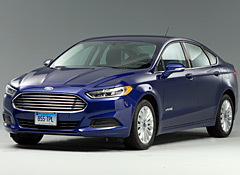Ford & EPA Try To Figure Out Why C-Max, Fusion Aren’t Getting Advertised MPG

Ford claims the Fusion Hybrid gets 47 mpg. The Consumer Reports test puts that number at 39 mpg.
The Consumer Reports tests found that that the C-Max and Fusion actually only get a combined city/highway fuel economy of 37 mpg and 39 mpg, respectively. While this is still an impressive number, and far more fuel-efficient than most vehicles on the road, the disparity between real-world numbers and what Ford is telling consumers could be cause for concern.
Ford claims that its testing procedures follows the EPA’s published rules, but that it is “working closely with industry to see if we need change our hybrid testing procedure.”
A VP at the car company tells the Wall Street Journal that a possible explanation could maybe be, in theory, that the Consumer Reports testers were driving faster or in colder weather. He claims that, because the C-Max is designed to operate on battery alone up to speeds of 62 mph, fuel economy could drop by 17 mpg just by driving the car at 75 mph instead of 65 mph. Likewise, if a new C-Max is tested in 40-degree weather rather than 75-degree outdoor temperatures, you’ll see a similar drop in fuel economy.
Yesterday, Consumer Reports wrote this about the differences between its testing procedures and those done by the EPA:
In the Consumer Reports highway test, we record the average fuel usage in two directions at a steady 65 mph on a specific section of highway. In contrast, the majority of the EPA highway cycle simulates a vehicle traveling mostly at speeds below 55 mph. Although the EPA tests reach 80 mph at times, the highway tests include a fair amount of gentle acceleration and coasting. Speeds average only about 48 mph. Under these conditions, Ford’s hybrid drive allows the gasoline engine to completely shut off at times, with the resultant increase in fuel economy.
It’s worth noting that of all the cars tested by Consumer Reports, the results for the C-Max and Fusion hybrids showed the greatest disparity between real-world testing and the EPA-estimated fuel economies. Most vehicles were within 3 mpg of the EPA estimates.
Earlier this week, the EPA said it would investigate Ford’s mpg numbers on these two vehicles. While the agency has the ability to double-check car makers’ submitted estimates, it is only able to spot-check a fraction of all new cars released each year.
Want more consumer news? Visit our parent organization, Consumer Reports, for the latest on scams, recalls, and other consumer issues.

